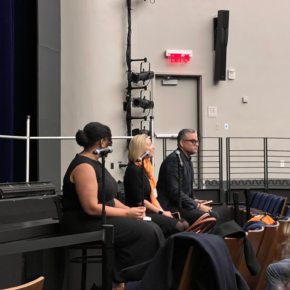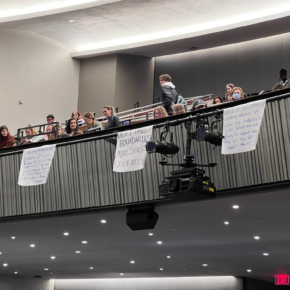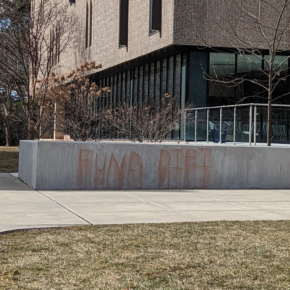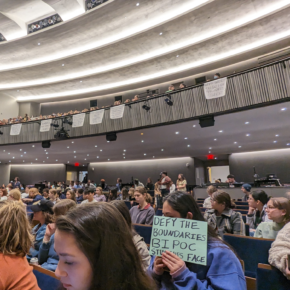



On Feb. 22, the Office of Communications announced that the Board of Trustees (BoT) would offer concurrent meetings for students, faculty and staff respectively. These meetings took place on Friday, Feb. 24, from 10:30 a.m. to 12:00 p.m. The simultaneous nature of these meetings meant that students, staff and faculty would not be able to engage in discussions as one body, while members of the Board were similarly split up.
Below we will outline the main happenings of each open forum to further align the goals of the student, faculty, and staff.
STUDENT
While there are 35 members of the Board of Trustees, just three were present on the panel: Sydney Lamb, Karen Quint, and Jonathan McBride. An unspecified number of trustees were also present in the crowd. Students filled both the lower and balcony levels of the recently renovated Palmer Auditorium, and two microphones were set up to amplify the voices of students who queued up to ask questions.
The forum opened with a question focused on the College’s commitment to shared governance and its commitment to diversity, equity, and inclusion, asking plainly about what steps the Board plans on taking and on what timeline. The Board responded by reaffirming their commitment to providing additional funding to DEI while initiating an independent review of both President Bergeron and the College’s previous DEI actions and future commitments. The Board also explained their reasoning behind hiring an outside, independent review firm, stating that they provide context of DEI initiatives at other institutions on a national scale. While the faculty letter to the Board states great disdain about the decision to hire an outside firm, and expressed their desire to alternatively use internal committees, the Board stood strong in defense of this key part of their response. The Board ensured that the use of an outside firm does not exclude the voices of the Conn community. However, when students pressed on about the cost and timeline of this review, the Board asked for patience, stating that they are working to make a decision that is thought out and informed as opposed to reactionary. They further mentioned that this is a matter of weeks, not months, while stressing multiple times that the Board is sympathetic to the urgent nature of the students’ demands.
The discussion then turned to allegations of President Bergeron’s culture of bullying and intimidation outlined by Dean King and other members of the faculty. The Board refused to comment, stating that it is not appropriate or in their means to comment on bullying allegations. Further, these allegations are private and confidential from a legal perspective.
One student spoke to the importance of these types of community-oriented discussions, calling for the next presidential search to include diverse committees of students, faculty and staff. The Board quickly acknowledged this, claiming that their current process includes a variety of voices, making sure to note the importance of regular dialogue with student representatives who meet with the Board and engage in the various decision-making processes on campus.
For the remainder of the forum, students focused on sharing their individual experiences with various concerns around campus. Present members of the Board encouraged this dialogue, and it quickly became clear that the Board remains very disconnected from the reality of the student experience. Various students shared their experiences with the general lack of support across DEI offices on campus, with specific emphasis on the offices of Sexual Violence Prevention and Advocacy (SVPA) and Title IX. Both offices have struggled to retain senior staff members, forcing students to over-exert themselves in running operations. Students also spoke about the poor conditions of these offices, some located in the basement of dorm buildings, others in physical disrepair. Students generally conveyed their frustrations with the state of many offices on campus, highlighting the negative impact that these disparities have on the daily lives of students.
Students then went on to share other frustrations about various aspects of life at Conn. These plights focused greatly on housing conditions, both through overcrowding of dorms, lack of common rooms and the generally poor condition of rooms. Students mentioned cases of mold, flooding, and leaking throughout dorms across campus. Lazarus dorm was highlighted for the condition of its kitchen and small rooms with lack of windows. This is a specific issue as it houses many international and BIPOC students.
The Board reacted to this type of sentiment with remarks of surprise and said they appreciated learning about the shared experiences of students. They further acknowledged that many of these similar issues have persisted since their time at Conn, and while not directly related to the controversy surrounding President Bergeron, Dean King and DIEI, these issues highlighted failures of the administration to provide students with adequate facilities and support.
This disconnect between students and the Board highlights many of the institutional issues at play. While the Board holds massive power to enact change, they remain ignorant of the daily struggles of many students on campus. This open forum represents a step in the right direction, as student voices that needed to be heard were given the opportunity to openly air frustrations at those that yield the power to meet the demands of students.
FACULTY
Around 80 faculty members were present, while three trustees sat on the panel: Debo Adegbile, Lynn Cooley, and Leslie Wong. Faculty members present at the meeting reported to The Voice that the Board deflected many direct questions, answering that they cannot give timelines, are in a listening phase, and are gathering inputs on a wide range of issues, many of which are outside of the scope of their work. However, they did clarify that the ongoing independent review is of President Bergoron as opposed to the DIEI initiatives on campus. The Board also confirmed that the review will not be available to the campus community, commenting that it would be inappropriate to give outside access to this information.
Similarly to the scope of the student forum, the faculty meeting quickly turned from a question and answer format toward a statement-focused discussion, with faculty members describing their displeasure with the current president, administration and generally the way campus is being operated. One statement was related to the extremely high cost of turnover. With a constant revolving door of personnel at the College, a faculty member pressed on both the monetary, social and reputational cost of turnover across a wide range of departments. Leslie Wong confirmed that turnover is indeed very expensive for the College.
Faculty members then outlined a wide range of issues at the college, including but not limited to: the chaos of at-will clause, low enrollment one year followed by ridiculously high enrollment the next, lack of housing, lack of classrooms, lack of instructors, benefits cuts, faculty and staff filling in for empty positions, cockroaches and slugs in dorms, and black mold. The faculty noted that problems have been brought to the board on numerous occasions by the Faculty Steering and Conference Committee (FSCC) and pressed the present Board members on one main point: If all of these problems have persisted under the current leadership, in conjunction with the most recent issues, how can the board continue to have confidence in President Bergeron? The Board responded by once again stating that they are listening to a full spectrum of perspectives and will take this weekend’s notes back to the full board to come to a well-thought-out conclusion.
Various faculty members concluded the meeting by telling the Board that they are burnt out. They strongly stated that over time, Conn has degraded into an awful place to come to work, as they are reaching the point of not being able to do their job.
STAFF
While staff members could not be reached to provide an outline of their meeting with the Board, the Staff Council provided The Voice with the below message.
“The Staff Council is resolved in our mission to advocate for staff through our Shared Governance model. As we represent a diverse staff with diverse opinions, we continue to work toward creating and sustaining a community based in civility and the utmost respect for all human beings. We stand united in working toward full participation and firmly believe that we must “empower an increasingly diverse community of students, faculty and staff to thrive in their work and contribute to the flourishing of others” (excerpted from Building on Strength, the College’s strategic plan).
Through various meetings with staff, emails, conversations and Google form submissions, we have collected a vast number of narratives, concerns, and questions that have been shared with the Board of Trustees to help inform their review process as we work together as a community to map a way forward. There are four key areas of concern for Staff Council:
(1) Campus climate and leadership
(2) Divisional strain due to underfunding and under-resourced areas
(3) Trust
(4) Equity in the shared governance structure
The open meeting for staff with members of the Board of Trustees was a step in the right direction. As part of Shared Governance, the Staff Council is glad to be brought into the conversation in a meaningful way.
It is the people that make up our community that gives Connecticut College our strength – Our colleagues and friends among the staff and faculty, and most importantly, our students.
On behalf of staff, the Staff Council would like to recognize, and say thank you for the communication and support from faculty and students. There is much work to be done in the coming days and weeks as we map a way forward, and we are stronger together.”
Update: The College Voice reached out to members of the Board of Trustees for commenting received a response from Vice President of Marketing and Communications. The Boards comment is:











[…] meetings with students and faculty members regarding the lack of diversity initiatives on Feb. 24, The College Voice reported. Students began their building takeover the following […]
[…] meetings with students and faculty members regarding the lack of diversity initiatives on Feb. 24, The College Voice reported. Students began their building takeover the following […]
[…] meetings with students and faculty members regarding the lack of diversity initiatives on Feb. 24, The College Voice reported. Students began their building takeover the following […]